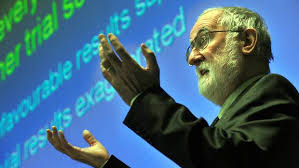Carl Heneghan
In 2019, EBM Live set out to identify and fix some of the problems with how research evidence is developed and disseminated to end-users. Issues outlined in the EBM Manifesto: how do we reduce questionable research practices, bias, and conflicts of interests? How do we expand the role of patients, health professionals and policymakers in research? And how do we make research evidence relevant, replicable and accessible to end-users?
Isabelle Boutron, professor of epidemiology at the Paris Descartes University gave us insights into the world of spin in research; Jeanne Lenzer, independent medical investigative journalist, and long time contributor to The BMJ told us about the inherent conflicts in medicine that drive medical device disasters (read some of her articles at her website: www.jeannelenzer.com); and Kate Mandeville, London School of Hygiene and Tropical Medicine, – opened the Pandora’s Box on conflicts of interest, but not as we know them: examining two settings where disclosure is not yet the norm: the media and patient involvement.
We used these talks to set the scene for our workshop (that’s Margaret McCartney, Helen MacDonald and me) on Resolving Conflicts of Interest in Medicine. Posing many questions. What should we do about the conflicts of interest in medicine? Should doctors with commercial interests lead research on their products? Should we forget the term ‘conflict’ and start discussing ‘declarations of interest’ instead? Who should hold and maintain conflicts of interest registers? Should practising doctors work with the pharma industry as well as serve on guideline committees? And should researchers with extensive financial interests be disqualified from studies of their own products?
Having reviewed the history of conflicts of interest we gathered feedback from over 100 participants to help us provide a way forward with the current thinking on conflict of interests. Initial thematic analysis of responses suggests that making a transparent declaration is more important than disclosure of conflicts. Individuals judgements about their own conflicts are often inconsistent and not transparent. Providing a disclosure of all interests would allow end-users time to arrive at their own judgement about what constitutes a conflict and how it should be interpreted.
I am currently busy analysing the rest of the responses with the aim of providing recommendations on what should be declared by whom in what context when it comes to transparency; and more important who should oversee such a registry of declarations.
A significant amount can be achieved in one day when a group of conference attendees – including professionals, patients and members of the public – come together to analyse one issue and focus on the solutions about what should happen next.
Conflicts of interest:
Carl Heneghan has received expenses and fees for his media work (including payments from BBC Radio 4 Inside Health). He holds grant funding from the NIHR, the NIHR School of Primary Care Research, The NIHR BRC Oxford. He has received financial remuneration from an asbestos case and given free legal advice on mesh cases. He is Director of CEBM, which jointly runs the EvidenceLive Conference with the BMJ and the Overdiagnosis Conference with international partners, based on a non-profit making model. He is Editor in Chief of BMJ EBM and an NIHR Senior Investigator.




